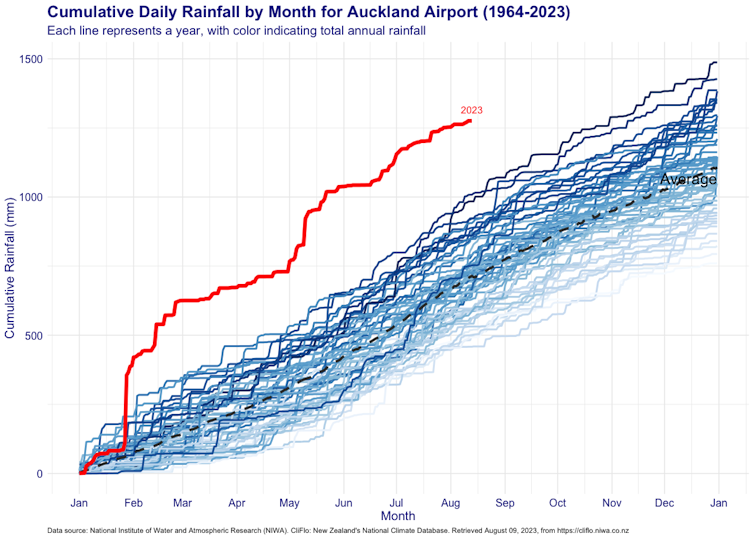Creating ‘sponge cities’ to cope with more rainfall needn't cost billions – but NZ has to start now
- Written by Timothy Welch, Senior Lecturer in Urban Planning, University of Auckland

Tune into news from about any part of the planet, and there will likely be a headline about extreme weather. While these stories will be specific to the location, they all tend to include the amplifying effects of climate change.
This includes the wildfire devastation[1] on the island of Maui in Hawaii, where rising temperatures have dried vegetation and made the risk that much greater[2]. In Italy, summer temperatures hit an all-time high one week, followed by massive hail storms and flooding[3] the next.
Flooding in Slovenia[4] recently left three people dead and caused an estimated €500 million in damage. At the same time, rainfall in Beijing[5] has exceeded a 140-year record, causing wide-scale flooding and leaving 21 dead.
These northern hemisphere summer events mirror what happened last summer in Auckland, classified as a one-in-200-year event[6], and elsewhere in the North Island. So far this year, rainfall at Auckland Airport has surpassed all records dating back to 1964.
Given more rainfall is one of the likeliest symptoms of a changing climate, the new report from the Helen Clark Foundation and WSP[7] – Sponge Cities: Can they help us survive more intense rainfall?[8] – is a timely (and sobering) reminder of the urgency of the challenge.
References
- ^ wildfire devastation (theconversation.com)
- ^ risk that much greater (www.theguardian.com)
- ^ massive hail storms and flooding (edition.cnn.com)
- ^ Slovenia (www.politico.eu)
- ^ Beijing (apnews.com)
- ^ one-in-200-year event (niwa.co.nz)
- ^ WSP (www.wsp.com)
- ^ Sponge Cities: Can they help us survive more intense rainfall? (helenclark.foundation)
- ^ NIWA (niwa.co.nz)
- ^ CC BY-NC-ND (creativecommons.org)
- ^ sponge city (theconversation.com)
- ^ cutting spending on critical stormwater repairs (www.nzherald.co.nz)
- ^ Auckland floods: even stormwater reform won’t be enough – we need a ‘sponge city’ to avoid future disasters (theconversation.com)
- ^ encourages urban sprawl (theconversation.com)
- ^ National’s housing u-turn promotes urban sprawl – cities and ratepayers will pick up the bill (theconversation.com)
- ^ Medium Density Residential Standards (environment.govt.nz)
- ^ recent report (theconversation.com)
- ^ urban “heat island” effect (theconversation.com)
- ^ Global Forest Watch (www.globalforestwatch.org)
- ^ Planting more trees could reduce premature heat-related deaths in European cities by a third – new research (theconversation.com)
- ^ We’re building harder, hotter cities: it’s vital we protect and grow urban green spaces – new report (theconversation.com)

















